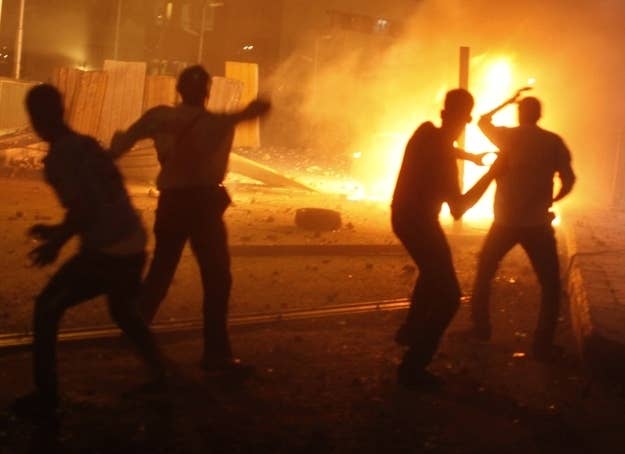
CAIRO — A bloody Friday here revealed two apparently irreconcilable countries: an Egypt that backed its army in dissolving the country's democratically elected government; and an Egypt of Muslim Brotherhood supporters furious at how they have been thrown from power.
The Brotherhood launched a campaign of civil — and at times violent — disobedience in the wake of the ouster of President Mohammed Morsi. Streetfighting between the Islamic group and its enemies, who include the Egyptian Army, left at least 30 dead around the country, medical officials told the Associated Press.
But with the armed forces and police deployed in the streets,it was hard to imagine the Brotherhood protesters taking back power for Egypt's now jailed president Mohammed Morsi.The events of the last week had left the Muslim Brotherhood outcasts, ostracized by the rest of the country and convinced their legitimate rights had been stolen.
Before Morsi's ouster, the Brotherhood and their opponents had existed within the framework of a democratic process established after the toppling of dictator Hosni Mubarak two and a half years ago, now that system was broken. The military was seeking to arrest their leaders and whatever words of reconciliation were whispered, the Islamist movement had been humiliated and left outside the tent. It is hard to imagine a peaceful and stable Egypt emerging quickly from the mess, that there could be reconciliation between their sides. Egypt's first effort to build a lasting democratic political system after Mubarak appears to lie in ruins.
Military and police officers spoke on Cairo streets with disdain for the Brotherhood, arguing they had carried out the people's will. Anti-Morsi demonstrators, whose political rallies gave the army the political cover to dissolve Morsi's government, hoped the Brotherhood would be banned again, as it had been before the 2011 revolution.
On Friday, the Brotherhood lashed out at its opponents, sending mobs of people into downtown Cairo. Thousands rushed across the October Sixth Bridge in an attempt to confront the anti-Morsi protesters in Tahrir Square, the country's symbol of revolution; a number exchanged gunfire with the anti-Morsi protesters before retreating. Other Brotherhood loyalists surrounded the nearby state television building. They raced on their missions in a fast gait waving Egyptian flags and flashing victory signs like a mad cavalry brigade before just as suddenly pulling back. They had answered those they believed wanted to destroy them.
They could not overrun downtown Cairo, but neither would they disappear. In the city's north, earlier in the day, the battle was bloodier and left a more bitter taste. Here thousands marched on Morsi's suspected jail in the military's Republican Guard headquarters. By the confrontation's end, there were four killed and 100 wounded. Any hope there was a space for them in this new Egypt had been shattered.
The protesters had started out from their rally in Nasr City, where the Brotherhood's supporters had been rallying for a week, setting up tents and mats for sleeping. Here, their leaders wanted for arrest hid among the masses. And the faithful started their march to Morsi's suspected jail.
Mohammed Shalby, a 38 year old carpenter, walked besides his cousin Mohammed Sobhy. They discussed their willingness to die for God.
They chanted the word peaceful, peaceful as they approached the driveway entrance to the Republican Guard Headquarters.
"We want to see Dr. Morsi, let us see him," the crowd shouted. Tear gas was fired. And shots rang out. It was unclear who fired police or the military's presidential guard. One bullet hit his cousin in the neck and the other in the heart. A group lifted Sobhy's body.
Shalby refused to abandon his position in front of the military headquarters nestled among the grey shoe box like high rises. He pushed forward. He swore they could overrun the security forces despite the shooting. But their leaders held them back.
Hours later he visited his cousin lying in a coma, his chest heaving as a respirator breathed life into him.
Shalby stood in the dark by the hospital and prepared to go back to the frontline. He didn't expect his cousin to be alive when he returned next and he wanted the same fate for himself.
"I am going there to die," he said, welcoming the thought of a bullet. "I am afraid we are heading towards civil war but I will defend my rights."
